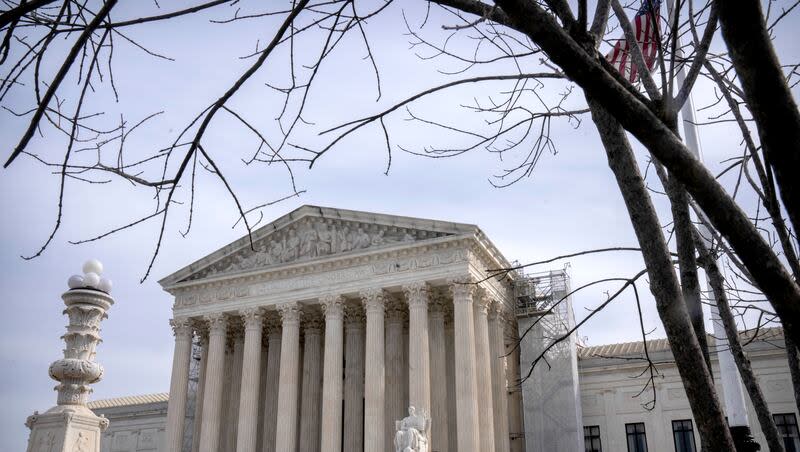An interesting question the Supreme Court won’t answer — yet

This article was first published in the State of Faith newsletter. Sign up to receive the newsletter in your inbox each Monday night.
The Supreme Court on Tuesday turned down a religion case I was tracking, deciding not to weigh in on whether potential jurors can be eliminated from consideration based on their religious beliefs about sexuality and marriage.
I researched the case, Missouri Department of Corrections v. Finney, as I wrote my October preview of the current Supreme Court term, and I thought it was both significant and interesting, the type of case I’d enjoy debating with friends who follow my work.
The battle was between the Missouri Department of Corrections and one of its employees, Jean Finney, who alleged that she had faced sex discrimination at work.
During the jury selection process for the trial, Finney’s lawyer asked potential jurors if they believe homosexuality is a sin. He then moved to dismiss the jurors who said yes, arguing that their religious beliefs would affect their beliefs about Finney’s case, since she is a lesbian.
The trial judge agreed to dismiss them, although she noted that the jurors had said their beliefs about sexuality would not interfere with their work.
Finney went on to win the case, but Missouri state officials appealed the decision, arguing that it was wrong to eliminate the religious jurors based on their beliefs.
After losing at the appellate level, state officials turned to the U.S. Supreme Court. They asked the justices to consider the dismissals and determine whether they amounted to religious discrimination.
On Tuesday, the Supreme Court declined to get involved, but Justice Samuel Alito published a statement emphasizing the importance of the issues involved.
Whether jurors can be dismissed based on their religious beliefs about sexuality is a “very serious and important question,” he wrote, one that he anticipated when the Supreme Court legalized same-sex marriage.
“In this case, the court below reasoned that a person who still holds traditional religious views on questions of sexual morality is presumptively unfit to serve on a jury in a case involving a party who is a lesbian. That holding exemplifies the danger that I anticipated in Obergefell v. Hodges, namely, that Americans who do not hide their adherence to traditional religious beliefs about homosexual conduct will be ‘labeled as bigots and treated as such’ by the government,” Alito said.
But he added that the Finney case was an imperfect vehicle for debating the issue, since the Missouri Department of Corrections “did not properly preserve” all the relevant details. He believes that, when it has the chance, the court should take up a different case asking the same question.
I don’t root for legal conflict to develop, so I wouldn’t say I’m rooting for such a case to pop up. I would say that I enjoy researching and discussing sticky questions like this one: When, if ever, is it OK to eliminate a potential juror based on their religious beliefs?
Fresh off the press
Churches are hosting dance parties. Is it a smart fundraising move — or ‘desecration’?
New book from ‘Today’ host celebrates faith in God
The Supreme Court cases to watch over the next 2 months
Term of the week: Intercalary day
Intercalary day is another name for Feb. 29, which is more commonly called leap day. It’s the day that comes around every four years to account for the fact that it takes the Earth about 365.25 days to orbit the sun.
The leap day system as we know it was created by a Catholic leader, according to Catholic News Service. In 1582, Pope Gregory XIII landed on the current plan after considering how best to keep the Easter holiday in the spring.
Intercalary day is on Thursday this year. Are you planning any unique celebrations?
What I’m reading...
After the Super Bowl parade shooting on Feb. 14, Bobby Ross Jr. traveled to Kansas City to speak with faith leaders there about how they’re working to combat gun violence. The resulting story, which he wrote for the Christian Chronicle, highlights a faith-based nonprofit serving shooting victims.
I clicked into this New York Times story about an atheist chaplain working with an atheist death row inmate because I wanted to learn more about the work of atheist chaplains. I kept reading all the way to the end because I was so touched by the powerful bond the two men came to share.
The Christian Science Monitor reported on the same execution, but the story was focused on “tough-on-crime lawmakers” who are beginning to question Oklahoma’s use of the death penalty.
Odds and ends
If you liked my essay in last week’s newsletter about competing in a pancake race, check out The Associated Press’ coverage of how the town where the tradition originated celebrates Shrove Tuesday each year.

